Adopting a gluten-free Mediterranean diet is an increasingly popular approach to healthy eating, suitable for individuals at various life stages. This diet combines the principles of Mediterranean eating, which emphasizes fruits, vegetables, legumes, whole grains, and healthy fats, with the necessity of avoiding gluten—a protein found in wheat, barley, and rye. Whether due to gluten intolerance, celiac disease, or personal preference, integrating a gluten-free approach into the Mediterranean lifestyle requires careful selection of ingredients and an understanding of how to maintain nutritional balance.

Crafting a meal plan that fulfills the needs of different ages and health circumstances can be challenging. Yet, the gluten-free Mediterranean diet is versatile, supporting the nutritional requirements across the lifespan—from children to the elderly. Incorporating key gluten-free Mediterranean ingredients into regular meals not only diversifies the palate but also helps in maintaining an optimal level of health. It’s about creating meals that are as nourishing as they are enjoyable, ensuring that the diet is sustainable over the long term, and adapting traditional recipes to be free from gluten without compromising on taste or nutrition.
Key Takeaways
- A gluten-free Mediterranean diet is beneficial for all life stages, focusing on whole foods and excluding gluten-containing grains.
- Nutrient-rich meals can be planned with gluten-free alternatives, promoting health and accommodating dietary restrictions.
- The diet supports a lifestyle that can reduce the risk of chronic diseases and improve overall well-being.
Table of Contents
Understanding Gluten-Free Mediterranean Diet
A gluten-free Mediterranean diet merges the heart-healthy principles of the traditional Mediterranean diet with the dietary needs of those with gluten sensitivity or celiac disease. This combination aims to enhance overall nutrition while ensuring food safety for individuals requiring a gluten-free lifestyle.
Basics of a Mediterranean Diet
The Mediterranean diet emphasizes a high intake of whole foods and plant-based foods such as vegetables, fruits, legumes, and nuts. It prioritizes healthy fats, predominantly olive oil, over saturated fats. Seafood is encouraged several times a week, while poultry, eggs, cheese, and yogurt should be eaten in moderation. An integral part of this diet, as outlined in the Mediterranean diet pyramid, is regular physical activity coupled with sharing meals with others.
What ‘Gluten-Free’ Really Means
“Gluten-free” indicates the absence of gluten, a protein composite found in wheat, barley, rye, and derivatives such as malt or triticale. For individuals with celiac disease or non-celiac gluten sensitivity, gluten can trigger harmful immune responses. Hence, a strict gluten-free diet is essential for maintaining health and preventing symptoms or complications of these conditions.
Benefits of Combining Gluten-Free with Mediterranean Diet
Melding a gluten-free approach with the Mediterranean diet can lead to a nutritiously balanced framework, especially for those with celiac disease. It provides the benefits of improved heart health and a diverse intake of micronutrients from a variety of fruits, vegetables, and healthy fats, without the risk of gluten-induced symptoms. Additionally, the focus on whole foods and plant-based nutrition can aid in achieving and maintaining a healthy weight.
Common Misconceptions
One common misconception is that a gluten-free diet automatically leads to a healthier lifestyle. However, such diets might lack certain nutrients if they are not well-balanced. Another misconception is that adopting a Mediterranean diet is difficult or restrictive when gluten-free. In fact, with careful planning and substitutions, one can enjoy a vast array of flavorful and healthful gluten-free Mediterranean dishes.
Nutritional Guidelines for Different Life Stages
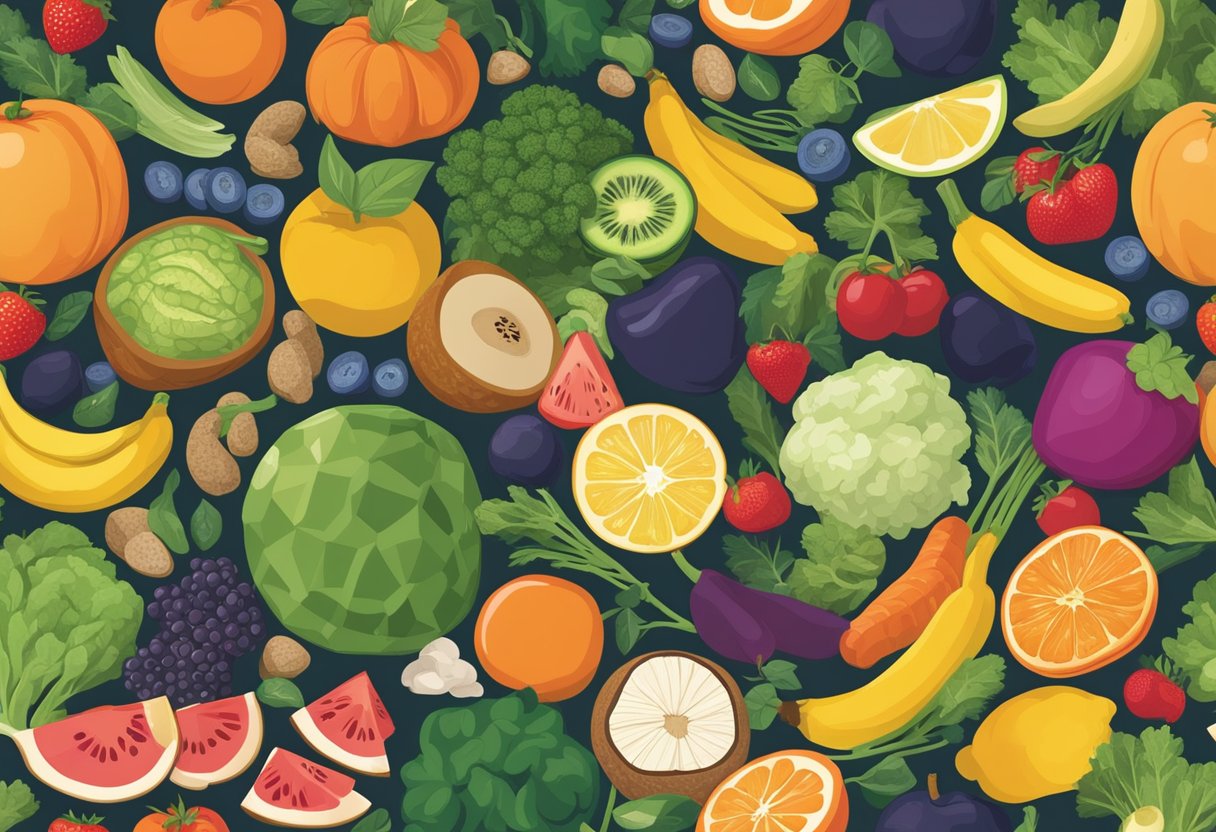
A gluten-free Mediterranean diet offers a rich variety of foods that provide essential nutrients for every life stage, ensuring a balanced intake of whole grains, fruits, and vegetables, while avoiding gluten-containing products.
Infants and Toddlers
For infants transitioning to solids and toddlers, it is important to introduce gluten-free whole grains like quinoa and rice. They should also consume a variety of pureed or soft vegetables and fruits to ensure a wide range of vitamins and minerals. Small amounts of pureed legumes can introduce protein and fiber into their diet.
Children and Adolescents
Children and adolescents need a well-rounded diet that promotes growth and development. Gluten-free options such as buckwheat and amaranth can serve as healthy whole grain sources. Vegetables and fruits should be a staple for fiber and nutrients, while nuts and seeds can provide healthy fats and protein. Dairy or dairy alternatives ensure adequate calcium intake for bone health.
Adults
Adults should focus on maintaining a healthy balance of nutrients. A diet rich in gluten-free whole grains, an abundance of vegetables and fruits, and a variety of proteins from legumes and seafood promotes general health. They should also incorporate nuts and seeds for additional protein and fiber, as well as healthy fats.
Seniors
For seniors, nutrient-dense foods that prevent age-related diseases are key. They should eat high-fiber whole grains, an array of colorful vegetables and fruits to maximize antioxidant intake, and lean proteins to maintain muscle mass. Calcium-rich foods like dairy or fortified alternatives are crucial to prevent bone density loss. Legumes and seeds can contribute necessary nutrients while promoting digestive health.
Creating a Gluten-Free Mediterranean Meal Plan
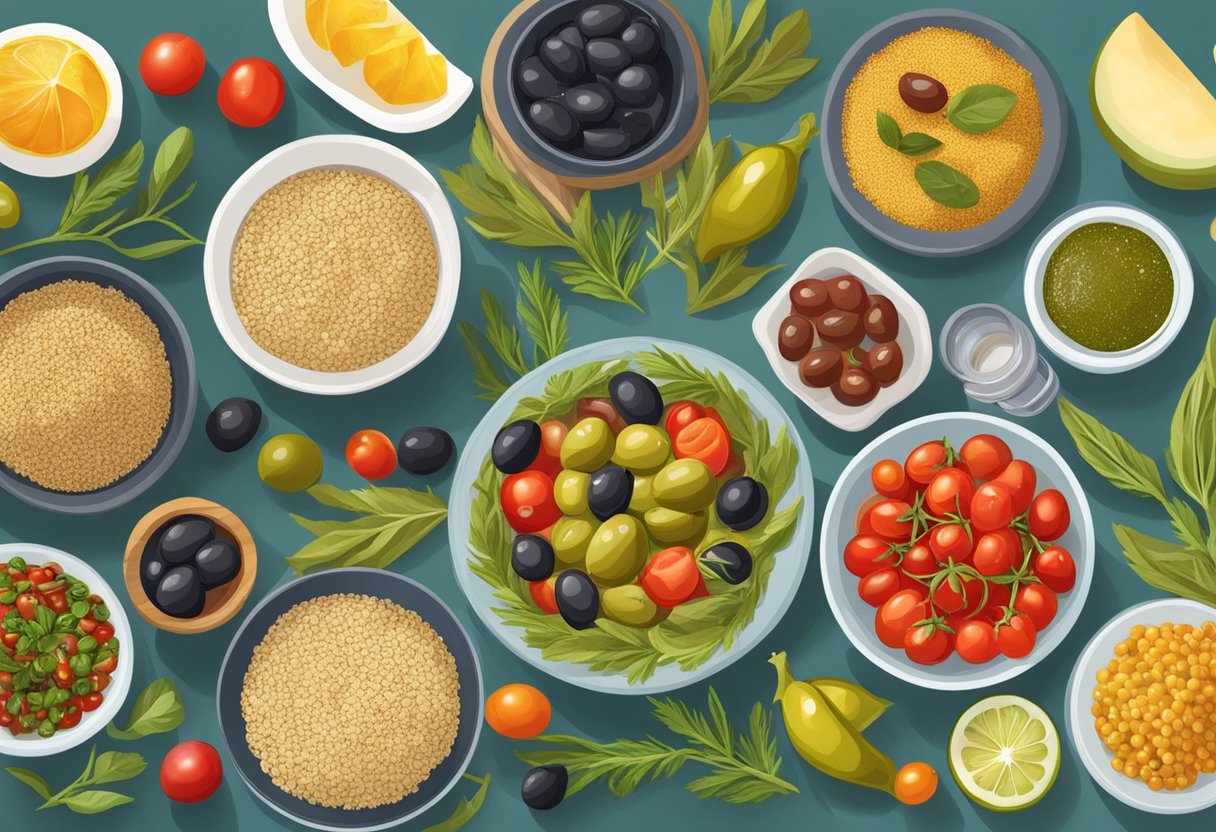
Crafting a gluten-free Mediterranean meal plan involves selecting a variety of whole grains, fruits, vegetables, nuts, seeds, and proteins, ensuring meals are both nourishing and diverse.
Structuring Meals
A balanced gluten-free Mediterranean meal plan focuses on incorporating whole grains like quinoa and brown rice, a colorful array of vegetables, fruits, legumes, nuts, seeds, and proteins such as fish and chicken. It’s essential to favor these ingredients at each meal to diversify nutrient intake and adhere to Mediterranean dietary principles.
Sample Meal Ideas for Breakfast
Begin the day with:
- Quinoa Porridge: Cooked quinoa, almond milk, topped with sliced fruits and nuts
- Omelet: Mixed vegetables and herbs with a side of gluten-free whole grain toast
| Item | Ingredients |
|---|---|
| Quinoa Porridge | Quinoa, almond milk, fruits, nuts |
| Omelet | Eggs, mixed vegetables, gluten-free whole grain toast |
Sample Meal Ideas for Lunch & Dinner
For the main meals, consider:
- Lentil Salad: Mixed greens, lentils, cherry tomatoes, cucumber, feta cheese, with olive oil dressing
- Grilled Fish: Served alongside a quinoa salad with vegetables like roasted bell peppers and olives
| Lunch | Ingredients |
|---|---|
| Lentil Salad | Mixed greens, lentils, cherry tomatoes, cucumber, feta, olive oil |
| Dinner | Ingredients |
| Grilled Fish | Fish, quinoa, roasted peppers, olives |
Gluten-Free Snacks and Desserts
Healthy, gluten-free options include:
- Snacks: Cherry tomatoes with hummus, or a handful of nuts and seeds
- Desserts: Fresh fruit salad, or yogurt with honey and gluten-free granola
| Type | Options |
|---|---|
| Snacks | Cherry tomatoes with hummus, nuts, seeds |
| Desserts | Fruit salad, yogurt with honey and gluten-free granola |
Incorporating Key Gluten-Free Mediterranean Ingredients

Transitioning to a gluten-free Mediterranean diet revolves around selecting alternative grains, emphasizing healthy fats and oils, and choosing lean proteins. The following subsections break down the essential components and provide specific guidance for their inclusion.
Whole Grains and Alternatives
To maintain the integrity of a gluten-free diet while following Mediterranean dietary patterns, one must choose grains that do not contain gluten. Traditional wheat-based pastas and breads are replaced with options like:
- Brown rice: A versatile staple that can be used in a variety of dishes.
- Quinoa: A pseudo-cereal that is protein-rich and complements many Mediterranean flavors.
Legumes such as lentils and chickpeas are also excellent gluten-free alternatives that provide essential fiber and nutrients.
Healthy Fats and Oils
The heart of the Mediterranean diet is its use of healthy fats:
- Olive oil is the primary source of fat, known for its anti-inflammatory properties.
- Nuts like almonds and walnuts, along with seeds such as flaxseeds and chia seeds, are additional sources of healthy fats and can be incorporated into meals or eaten as snacks.
These oils and fats not only carry health benefits but also enhance the flavor profiles of various dishes.
Lean Proteins
Seafood, particularly fish rich in omega-3 fatty acids like salmon and sardines, is an integral lean protein source for the Mediterranean diet. Skinless poultry and plant-based proteins from legumes and nuts also constitute important protein sources. These proteins are vital for building and repairing tissues and should be consumed in moderation to align with the Mediterranean principle of balanced eating.
Shopping and Cooking Tips

When embarking on a gluten-free Mediterranean diet, selecting the right ingredients from your grocery list and understanding proper food preparation techniques is crucial for maintaining a healthy and enjoyable eating plan.
Gluten-Free Grocery Shopping
Crafting an effective shopping list is foundational to adhering to a gluten-free Mediterranean diet. Begin with a variety of fruits and vegetables to ensure a colorful array of nutrients. Opt for gluten-free grains such as quinoa, rice, and certified gluten-free oats. Stock up on olive oil for cooking and salads, and include ingredients like chickpeas and tahini for homemade hummus. Always double-check labels for hidden gluten and cross-contamination warnings.
Preparation and Cooking Techniques
During food preparation, prioritize freshness and simplicity. Make a vibrant quinoa salad as a staple, and consider grilling or baking lean proteins like chicken or fish with an array of spices. Utilize olive oil as a heart-healthy fat for cooking and dressings. Remember to wash all fresh fruit and vegetables thoroughly to remove any potential contaminants.
Avoiding Contamination
To avoid contamination, always clean cooking surfaces and utensils meticulously before use. Dedicate a specific area of your kitchen for gluten-free food prep. Use separate appliances or protective covers, such as toaster bags, when handling gluten-free products to prevent cross-contact with gluten-containing foods.
Storing Gluten-Free Foods
Proper storage is key to preserving the integrity of gluten-free foods. Place these items in sealed containers and clearly label them as “gluten-free” to prevent accidental mixing. Store dry goods in a cool, dry place and keep perishable food like fruits and vegetables in the appropriate compartments of your refrigerator to maintain freshness.
Health Benefits and Potential Risks

Adopting a gluten-free Mediterranean diet brings significant health benefits but also warrants attention to potential risks across different life stages from childhood to senior years.
Promoting Heart and Overall Health
The gluten-free Mediterranean diet is revered for its enriching heart health attributes. It prioritizes fish over red meat, which is high in heart-healthy omega-3 fatty acids, and includes plenty of fruits and vegetables. These are sources of essential antioxidants and fiber, contributing to overall health enhancement. There is ongoing research suggesting that such a diet can lower the risk of heart disease.
Reducing the Risk of Chronic Diseases
This diet’s fiber-rich components and anti-inflammatory properties are conducive to a reduced risk of several chronic conditions. Studies indicate it may diminish the likelihood of cancer, stroke, and even Alzheimer’s disease. For those with celiac disease, it provides a safe eating framework that aligns with the guidance from the Celiac Disease Foundation, ensuring they receive adequate nutrition without the gluten that can trigger immune responses.
Concerns and Considerations
Despite these benefits, individuals should be aware of certain risks. The modification to gluten-free necessitates vigilance to prevent nutritional deficiencies often encountered in gluten-free products, such as lack of B vitamins and iron. Moreover, without proper planning, a gluten-free diet could lead to an excessive intake of processed substitutes, potentially undermining the diet’s weight loss and health-promoting advantages. It’s crucial to consult healthcare professionals to tailor this diet to personal nutritional needs.
Adapting Mediterranean Recipes to Be Gluten-Free
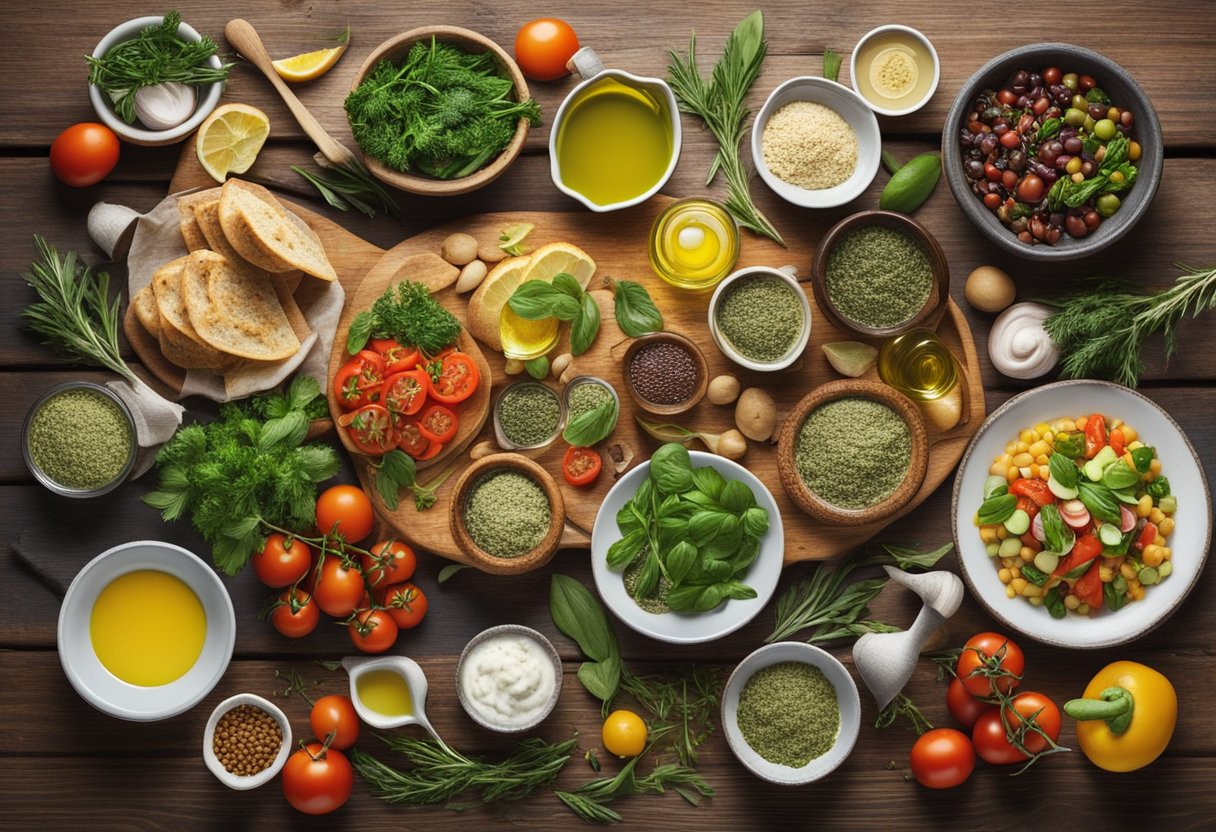
When adapting Mediterranean recipes for a gluten-free diet, it is important to substitute gluten-containing ingredients with gluten-free alternatives, while still maintaining the nutritional and flavor profiles of the original dishes.
Breakfast Recipes
For a gluten-free breakfast, traditional cereals containing wheat can be replaced with grains like quinoa or buckwheat. A Mediterranean-inspired breakfast might include quinoa porridge seasoned with cinnamon and topped with fresh fruits and nuts, ensuring a high-protein start to the day that’s also rich in fiber. For a savory option, omelettes filled with vegetables such as spinach and tomatoes, drizzled with olive oil, and sprinkled with herbs can provide a hearty and nutritious meal.
Lunch and Dinner Recipes
Lunch and dinner in a gluten-free Mediterranean diet might feature proteins such as salmon or legumes like chickpeas and lentils. Simple swaps like using gluten-free grains instead of traditional couscous or bulgur wheat allow dishes like tabbouleh to remain diet-friendly. One could prepare a grilled salmon with a side of lemon-herb quinoa salad. Tuna salad on a bed of greens or stuffed in gluten-free pita pockets makes for an easy and fulfilling meal.
- Grilled Salmon with Quinoa: Grill salmon with a dash of lemon, serve with a quinoa salad mixed with vegetables and olive oil.
- Tuna Salad: Combine tuna with gluten-free mayo, serve atop mixed greens or in a gluten-free pita.
Snacks and Salad Recipes
Snacks in a gluten-free Mediterranean diet are not only delicious but also nutrient-dense. Options like hummus paired with vegetable sticks or gluten-free crackers make for an excellent snack. Seeds and nuts are great for snacking as well due to their healthy fats and protein content. For salads, one can assemble a variety of greens with toppings like sliced almonds or sunflower seeds, and for added substance, throw in some chickpeas or diced grilled chicken.
- Hummus and Veggies: Blend chickpeas with tahini, garlic, and olive oil; serve with carrot and cucumber sticks.
- Quinoa Salad: Toss cooked quinoa with diced vegetables, seeds, and a vinaigrette dressing.
Lifestyle and Support
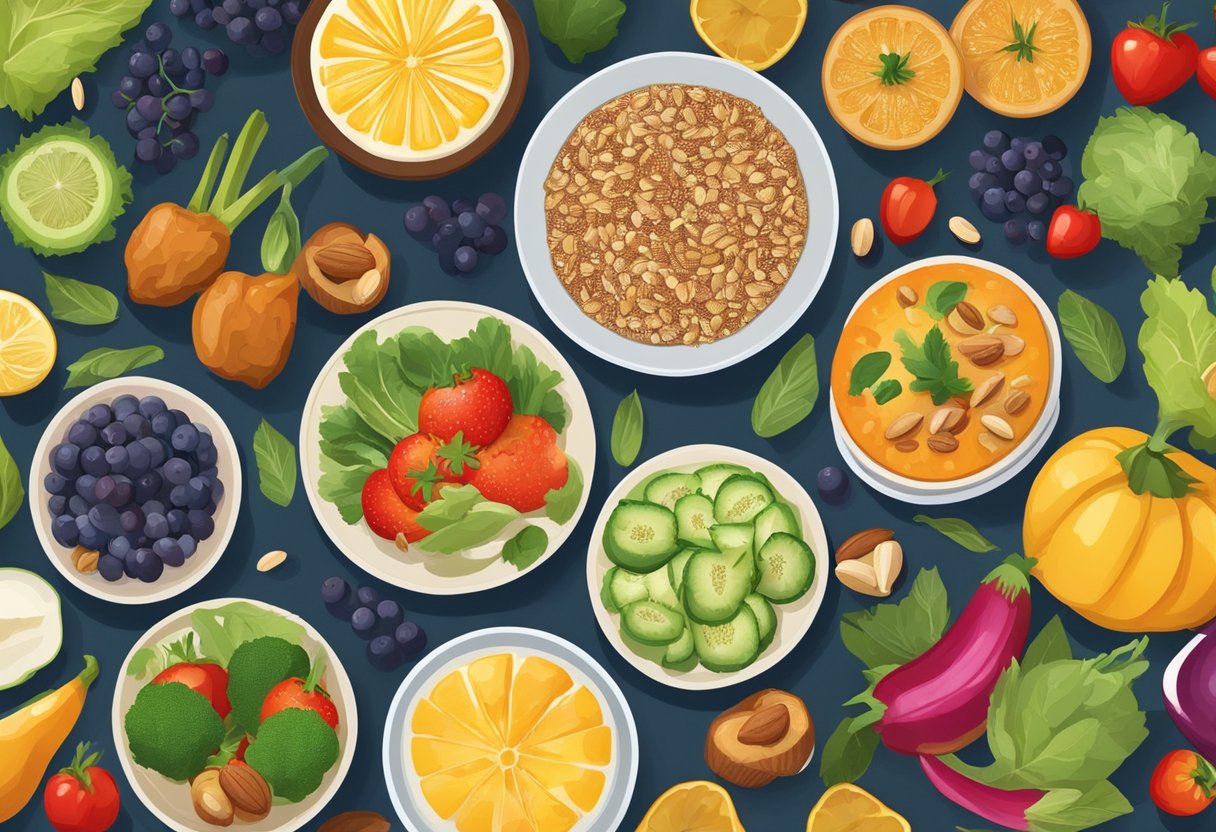
Successfully maintaining a gluten-free Mediterranean diet requires understanding the influence of lifestyle factors and the availability of supportive resources. This section sheds light on the pivotal role that community and family play in this dietary practice, as well as the valuable support resources and information that can facilitate a healthful lifestyle in alignment with dietary needs.
The Role of Community and Family
Community and family can significantly impact an individual’s ability to follow a gluten-free Mediterranean diet. Studies have shown that those who have strong support systems are more likely to maintain healthy eating habits. Community groups can offer invaluable peer support and exchange of information, while family members who adopt similar dietary habits can create an environment conducive to a gluten-free Mediterranean lifestyle. The Celiac Disease Foundation provides a framework for understanding the reduced risk associated with a Mediterranean diet and underscores the importance of communal support.
Support Resources and Information
Access to accurate support resources and information is fundamental for individuals with celiac disease or gluten sensitivity. Reliable resources can offer guidance on food selection, meal planning, and navigating social situations, which is crucial for sustaining overall health. Organizations like the Celiac Disease Foundation have introduced specific meal plans to assist in this endeavor. In addition, medical professionals can provide essential medical advice to ensure nutritional needs are met. It’s important for individuals to seek out research-based resources to ensure they are receiving factual and beneficial information.
Conclusion and Future Outlook
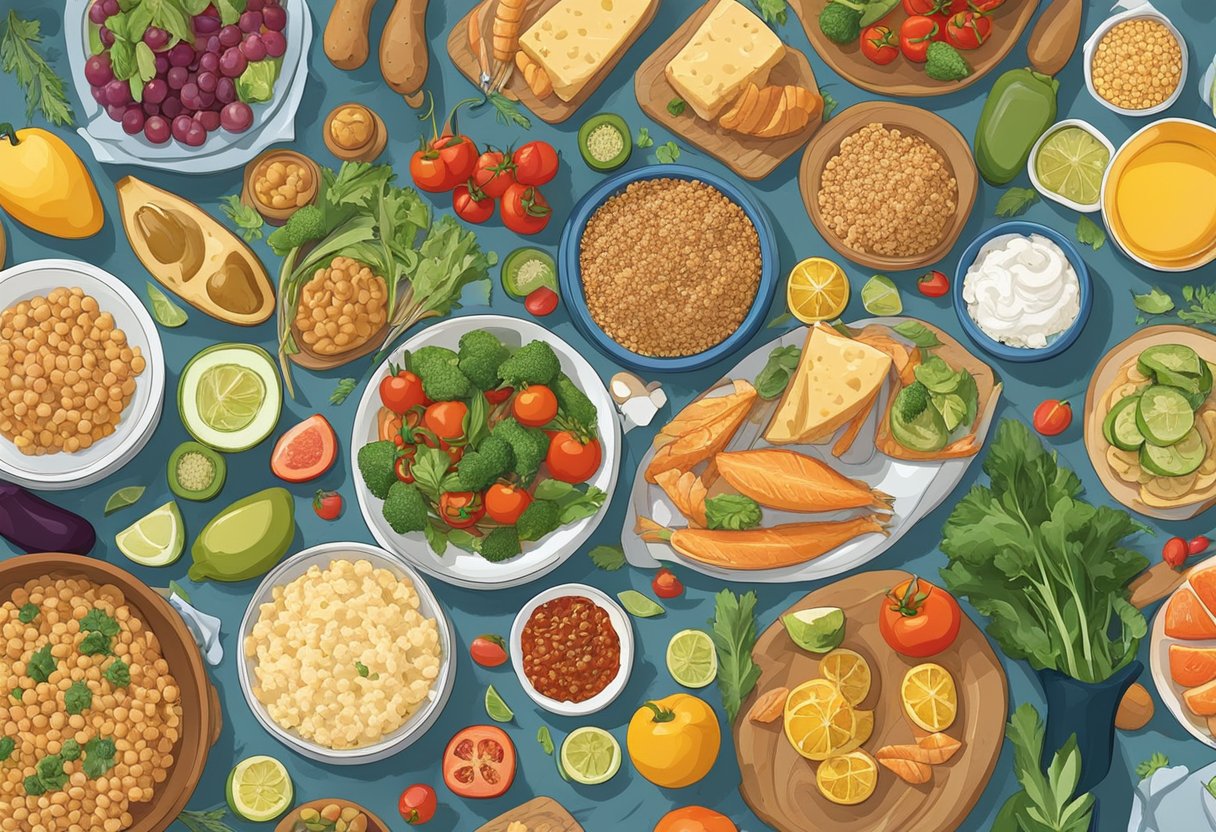
The gluten-free Mediterranean diet combines the heart-healthy principles of the traditional Mediterranean diet with gluten-free alternatives to accommodate individuals with gluten sensitivities. It emphasizes fruits, vegetables, whole grains, legumes, nuts, and seeds, along with healthy fats from sources like olive oil and avocados, and recommends fish and seafood twice a week.
Healthy eating habits established through this diet are adaptable to various life stages and contribute to long-term overall health. Research indicates a correlation between the diet and reduced inflammation, a benefit particularly relevant for those with celiac disease or gluten intolerance.
Looking ahead, more research may refine gluten-free food options, improving availability and nutritional quality. Healthcare professionals should continue guiding patients to ensure the diet meets nutritional needs while remaining palatable and sustainable.
The integration of the gluten-free Mediterranean diet into one’s lifestyle should nonetheless be individualized, respecting personal dietary requirements and cultural preferences. As both the medical community and the public gain further understanding, such dietary patterns may see broader adoption for their balance of health, flavor, and versatility.
The future outlook remains optimistic. Continuous advancements in gluten-free foods combined with the enduring principles of the Mediterranean diet provide a strong framework for healthful living. As more people adopt this approach, the collective experience and feedback will inevitably refine these dietary practices for even greater efficacy and enjoyment.
Frequently Asked Questions
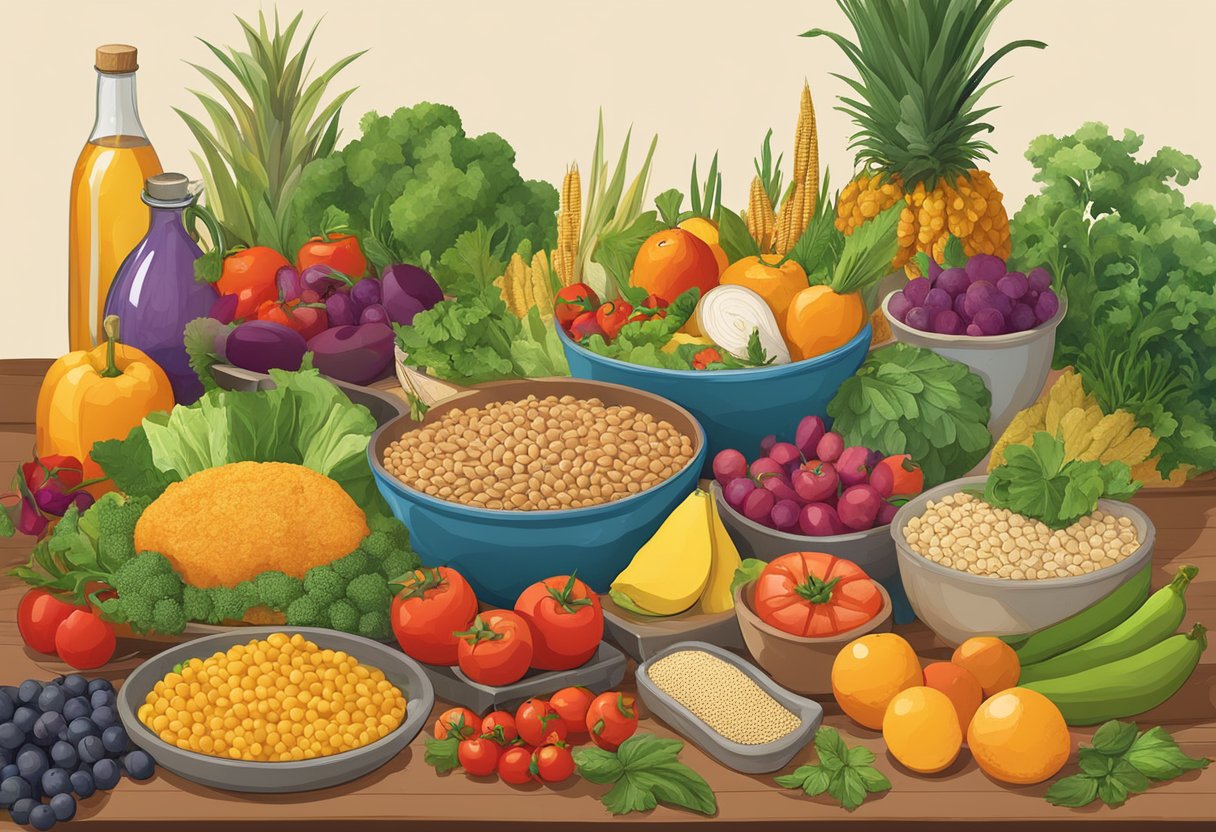
In navigating a gluten-free Mediterranean diet across various life stages, certain queries repeatedly arise. This section aims to specifically address these questions, offering practical advice and information.
What are some essential items to include in a gluten-free Mediterranean diet shopping list?
Essential items for a gluten-free Mediterranean diet shopping list include fresh vegetables and fruits, legumes, nuts, seeds, fish, lean poultry, dairy, and gluten-free whole grains. One can also explore Mediterranean diet handouts for more specific guidance.
Could you recommend a breakfast menu suitable for a gluten-free Mediterranean diet?
A breakfast menu suitable for a gluten-free Mediterranean diet might feature a mix of scrambled eggs with spinach and feta, alongside fresh fruit. Gluten-free whole grain toast or gluten-free oatmeal topped with almonds and berries can also be part of a balanced breakfast.
How do you adjust traditional Mediterranean diet recipes to accommodate a gluten-free lifestyle?
To adjust traditional Mediterranean recipes for a gluten-free lifestyle, substitute gluten-containing grains with gluten-free options like quinoa or buckwheat. Use gluten-free condiments and check the labels on packaged foods to ensure they are free from gluten.
What are the health benefits of following a gluten-free Mediterranean diet?
The health benefits of a gluten-free Mediterranean diet include improved heart health, better glycemic control, and a decreased risk of chronic diseases. This diet emphasizes nutrient-dense foods that are naturally gluten-free, promoting an overall wholesome lifestyle.
Are there comprehensive meal plans or cookbooks that cater to a gluten-free Mediterranean diet?
Yes, there are meal plans and cookbooks specifically designed for a gluten-free Mediterranean diet. The Celiac Disease Foundation offers a 7-day meal plan, and various cookbooks provide an extensive selection of gluten-free Mediterranean recipes.
What options are available for dining out while adhering to a gluten-free Mediterranean diet?
When dining out on a gluten-free Mediterranean diet, individuals can look for restaurants that offer gluten-free options and are familiar with proper food handling to avoid cross-contamination. Menu items such as grilled fish, salads without croutons, and vegetable-based dishes are typically safe options.



